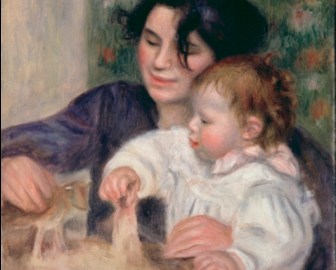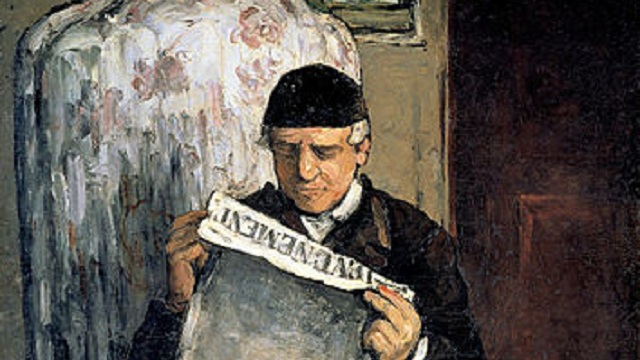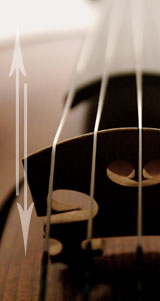A Father’s Tale: Renoir, Coleridge, and Fatherhood

Walking through the Late Renoirexhibition at the Philadelphia Museum of Art recently, I couldn’t help but be struck by the power of Pierre-Auguste Renoir’s paintings of his three sons—Pierre, Jean, and Claude. Renoir didn’t begin having children until he reached his fifties, but he doted on them and loved to paint them again and again, recording their childhood for all eternity. On this Father’s Day, I feel an affinity with Renoir and wonder at the love that appears in such works as 1895’s Gabrielle and Jean (shown). Here is a true father’s tale.
Renoir is best known for his beautiful paintings of the female nude. Gabrielle Renard, the nurse in Gabrielle and Jean playing with Jean Renoir, who went on to become a famous actor and filmmaker, actually posed for many of those nudes. Renoir loved to paint the members of his household—the captive audience of his daily life. By painting those closest to him, Renoir captured the little moments that make up life itself, such as the aimless playing with toy animals shown in Gabrielle and Jean. Today, we would call this a candid shot. Renoir’s ability to take this candid moment and infuse it with the power of his artistic vision says much of him as both an artist and a father. It is the perfect merging of self and art in the form of parental love. Renoir painted his eldest son Pierre, who also became an actor, in 1887 with his mother, Aline. His youngest son, Claude, called “Coco” by the family, is immortalized in youth in a 1908 sculpture by his father. A year later, Renoir painted Coco as a clown. Young Coco hated the clown outfit and complained of the itchiness of the white stockings he had to wear. Knowing those facts makes the boy’s expression more understandable. Better yet, you can imagine the grin on his father’s face as Coco complained while he was being painted. It’s a perfect parental moment—exasperating yet endearing.
As I think about my own role as a father, I try to place myself in the shoes of my own father and late father-in-law. Each of us takes on the role differently, in part due to different historical circumstances and simply being different people, but there are moments and emotions that transcend time and place. If I could paint at all, I would want to paint my sons as Renoir had painted his. And if I could write poetry, I would write poetry about my sons as Samuel Taylor Coleridge wrote of his. Ironically, Coleridge struggled to be a good father and husband, but his poetry of fatherhood has always stuck in my mind.
In “Frost at Midnight” (from 1798), Coleridge writes,
Dear Babe, that sleepest cradled by my side,
Whose gentle breathings, heard in this deep calm,
Fill up the intersperséd vacancies
And momentary pauses of the thought!
My babe so beautiful! it thrills my heart
With tender gladness, thus to look at thee,
And think that thou shalt learn far other lore,
And in far other scenes! For I was reared
In the great city, pent ‘mid cloisters dim,
And saw nought lovely but the sky and stars.
But thou, my babe! shalt wander like a breeze
By lakes and sandy shores, beneath the crags
Of ancient mountain, and beneath the clouds,
Which image in their bulk both lakes and shores
And mountain crags: so shalt thou see and hear
The lovely shapes and sounds intelligible
Of that eternal language, which thy God
Utters, who from eternity doth teach
Himself in all, and all things in himself.
Great universal Teacher! he shall mould
Thy spirit, and by giving make it ask.
It is a beautiful father’s wish for his child to hear the music of nature in a way that he, “in the great city, pent” couldn’t himself. Pent in the city myself as a child, I hope that suburban life gives my sons many opportunities I never had.
Coleridge’s other great fatherhood poem, “The Nightingale” (also from 1798), the poet writes of a nightingale, as poets do, but finds his child’s cry pulling him away from his poetic work:
Farewell, O Warbler! till to-morrow eve,
And you, my friends! farewell, a short farewell!
We have been loitering long and pleasantly,
And now for our dear homes.—That strain again!
Full fain it would delay me! My dear babe,
Who, capable of no articulate sound,
Mars all things with his imitative lisp,
How he would place his hand beside his ear,
His little hand, the small forefinger up,
And bid us listen! And I deem it wise
To make him Nature’s play-mate. He knows well
The evening-star! and once, when he awoke
In most distressful mood (some inward pain
Had made up that strange thing, an infant’s dream—)
I hurried with him to our orchard-plot,
And he beheld the moon, and, hushed at once,
Suspends his sobs, and laughs most silently,
While his fair eyes, that swam with undropped tears,
Did glitter in the yellow moon-beam! Well!—
It is a father’s tale: But if that Heaven
Should give me life, his childhood shall grow up
Familiar with these songs, that with the night
He may associate joy.—Once more, farewell,
Sweet Nightingale! Once more, my friends! farewell.
I’ve never taken my sons out to see the moon to quiet them, but I’ve often gone outside with them early in the morning and found that the sound of nature at work—the birds, the breeze—before people hustle and bustle on their way to work calms them, and me. Across the centuries I metaphorically nod to Coleridge in fatherly brotherhood, thanking him for sharing his “father’s tale.” On this Father’s Day, I thank every artist and every father for sharing their tales, and helping me build my own to share some day with my sons.
[Image:Gabrielle and Jean, 1895. Pierre-Auguste Renoir (French, 1841 – 1919). Oil on canvas, 25 5/8 x 21 1/4 inches. Framed: 34 1/8 x 38 inches. Philadelphia Museum of Art.]




